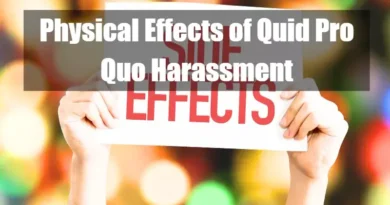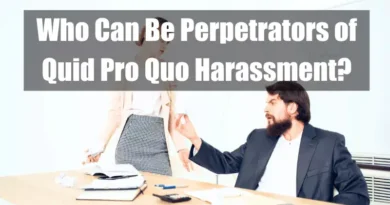Emotional Effects of Quid Pro Quo Harassment
Takeaways
| Key Points |
|---|
| Quid Pro Quo harassment has profound emotional effects, both immediately and in the long term. |
| Initially, victims often experience shock, disbelief, and confusion, as they struggle to understand how a trusted professional relationship could be exploited. |
| Fear and anxiety follow, with concerns about retaliation, job loss, or escalation of the harassment, while feelings of violation and betrayal take hold. |
| Short-term consequences include acute stress, hypervigilance, guilt, and self-blame, along with pervasive shame and embarrassment, which can lead to isolation and a reluctance to seek help. |
| Over time, the emotional toll can result in chronic anxiety, depression, PTSD, emotional numbing, and a loss of trust in authority figures, while impacting self-esteem, identity, and career performance, often causing burnout, decreased job satisfaction, absenteeism, and strained relationships with colleagues and loved ones. |
Introduction
Quid pro quo harassment is a form of workplace misconduct where a person in authority demands sexual favors in exchange for job benefits or the avoidance of negative consequences. The emotional effects of such harassment are profound, affecting the victim’s mental well-being, professional life, and social interactions.
Immediate Emotional Reactions

Shock and Disbelief
Victims of quid pro quo harassment often experience an immediate sense of shock and disbelief. The unexpected nature of the harassment can leave the victim feeling stunned as they grapple with the reality that someone they trusted or relied on professionally has violated their boundaries.
This disbelief is often accompanied by confusion as victims struggle to comprehend how a professional relationship could be exploited in such a manner.
Fear and Anxiety
Following the initial shock, victims commonly experience fear and anxiety. This fear stems from concerns about potential repercussions, such as job loss, demotion, or other forms of retaliation if they do not comply with the harasser’s demands. The anxiety is further exacerbated by the uncertainty of whether the harassment will continue or escalate, leaving the victim in a state of constant worry.
Feelings of Violation
Quid pro quo harassment leaves victims feeling violated on a deeply personal level. The exploitation of power dynamics to coerce sexual favors is a profound breach of trust, leading to feelings of helplessness and vulnerability. Victims may also feel a sense of betrayal, particularly if the harasser was someone they previously respected or admired in the workplace.
Short-Term Emotional Consequences

Acute Stress and Hypervigilance
In the short term, victims often experience acute stress and hypervigilance. The stress manifests in physical symptoms such as headaches, insomnia, and digestive issues as the body remains alert. Hypervigilance, characterized by an exaggerated state of awareness, is a common response as victims constantly anticipate further harassment or other threatening situations.
Guilt and Self-Blame
Many victims of quid pro quo harassment grapple with feelings of guilt and self-blame. They may irrationally believe they somehow invited the harassment or could have prevented it by acting differently.
This self-blame is particularly damaging, as it undermines the victim’s self-esteem and makes it more challenging to seek help or report the harassment.
Shame and Embarrassment
Shame and embarrassment are pervasive emotions experienced by victims. The personal and intimate nature of the harassment often leads to deep-seated feelings of humiliation. Victims may feel too ashamed to discuss the incident with others, fearing judgment or disbelief.
This internalized shame can isolate the victim, making them less likely to seek support.
Anger and Resentment
Anger is a natural response to violating personal boundaries and abusing power inherent in quid pro quo harassment. Victims often feel intense resentment towards the harasser and, in some cases, towards the organization for failing to protect them. This anger can be directed inward, leading to further emotional turmoil, or outward, potentially resulting in confrontations or aggressive behavior.
Long-Term Emotional Impact

Chronic Anxiety and Depression
Over time, the emotional toll of quid pro quo harassment can lead to chronic anxiety and depression. The persistent fear of retaliation or further harassment, combined with the ongoing stress of navigating a hostile work environment, can significantly impact a victim’s mental health. Depression may develop as feelings of hopelessness and helplessness intensify, making it difficult for victims to find joy or satisfaction in their daily lives.
Development of Post-Traumatic Stress Disorder (PTSD)
In severe cases, victims may develop Post-Traumatic Stress Disorder (PTSD). Symptoms of PTSD include flashbacks, nightmares, and severe anxiety, all of which can be triggered by reminders of the harassment. The trauma of quid pro quo harassment can leave a lasting imprint on a victim’s psyche, disrupting their ability to function in both personal and professional settings.
Emotional Numbing and Detachment
As a coping mechanism, some victims may begin to numb themselves to the situation emotionally. This detachment serves as a protective barrier against further emotional pain. Still, it can also diminish the ability to experience positive emotions. Emotional numbing can extend beyond the workplace, affecting relationships and the victim’s overall quality of life.
Loss of Trust in Authority Figures
The betrayal inherent in quid pro quo harassment often leads to a loss of trust in authority figures. Victims may become skeptical of those in power, fearing exploitation or abuse. This loss of trust can extend to other areas of life, making it difficult for victims to form healthy, trusting relationships with colleagues, supervisors, or even loved ones.
Impact on Self-Perception and Identity

Decreased Self-Esteem and Self-Worth
One of the most damaging effects of quid pro quo harassment is the erosion of self-esteem and self-worth. Victims may internalize the harassment, believing they are somehow deserving of such treatment or that their value is diminished.
This decrease in self-esteem can lead to a negative self-image, impacting all areas of the victim’s life.
Identity Crisis and Altered Self-Image
The experience of quid pro quo harassment can lead to significant challenges in self-identity, where victims may struggle to reconcile their self-image with the trauma of the harassment. They might question their competence, attractiveness, or worthiness, resulting in a distorted and often negative self-perception.
While these altered self-perceptions can persist long after the harassment has ended, the degree of impact varies, depending on individual resilience and the presence of a support system.
Distorted Perception of One’s Capabilities
Victims of quid pro quo harassment often develop a distorted perception of their capabilities. The harassment may lead them to believe they are only valued for their willingness to comply with the harasser’s demands rather than their professional skills and abilities.
This perception can undermine their confidence, making it difficult for them to pursue career advancement or take on new challenges.
Effect on Professional Life and Career

Emotional Burnout and Professional Detachment
The emotional strain of quid pro quo harassment can lead to burnout, characterized by physical and emotional exhaustion, cynicism, and a sense of inefficacy. Victims may become detached from their work, losing motivation and interest in their professional duties. This detachment can further exacerbate feelings of inadequacy and frustration, leading to a decline in job performance.
Decreased Job Satisfaction and Work Performance
Quid pro quo harassment can significantly decrease job satisfaction. The workplace becomes a source of stress and anxiety rather than a place of productivity and fulfillment. This dissatisfaction often translates into decreased work performance, as victims struggle to focus on their tasks amidst the emotional turmoil.
Increased Absenteeism and Job Turnover
Victims of quid pro quo harassment are more likely to take time off work to avoid their harasser or to cope with the emotional aftermath of the harassment. This absenteeism can lead to further professional consequences, including missed opportunities for advancement or negative performance evaluations. In many cases, victims may leave their jobs entirely, resulting in high turnover rates and losing valuable talent within the organization.
Social and Interpersonal Consequences

Strained Relationships with Colleagues and Supervisors
The emotional effects of quid pro quo harassment often strain the victim’s relationships with colleagues and supervisors. Victims may become withdrawn or distrustful, leading to difficulties in collaborating with others. Additionally, colleagues may be unaware of the harassment or even side with the harasser, further isolating the victim.
Isolation and Withdrawal from Social Interactions
As a result of the shame, guilt, and fear associated with quid pro quo harassment, victims may withdraw from social interactions. This isolation can exacerbate feelings of loneliness and depression as the victim loses touch with their support network. The reluctance to engage in social activities can also impact the victim’s ability to form or maintain new relationships.
Distrust in Personal Relationships
The betrayal experienced in quid pro quo harassment can lead to a broader distrust in personal relationships. Victims may struggle to trust others, fearing they will be exploited or betrayed again. This distrust can strain intimate relationships, leading to further emotional isolation and loneliness.
Coping Mechanisms and Their Emotional Repercussions

Healthy Coping Strategies (Therapy, Support Groups)
Seeking therapy or joining a support group are healthy coping strategies that can help victims process their emotions and begin the healing process. Professional therapy provides a safe space for victims to explore their feelings and develop strategies for managing their emotional responses. Support groups offer a sense of community, where victims can share their experiences with others who have faced similar challenges.
Unhealthy Coping Mechanisms (Substance Abuse, Avoidance)
Unfortunately, some victims may resort to unhealthy coping mechanisms, such as substance abuse or avoidance, to numb their emotional pain. These behaviors can provide temporary relief but often lead to further emotional and physical harm. Substance abuse, in particular, can exacerbate feelings of depression and anxiety, creating a vicious cycle of dependence and despair.
The Role of Emotional Support Networks

Having a strong emotional support network is crucial for victims of quid pro quo harassment. Friends, family, and trusted colleagues can provide the validation, empathy, and encouragement needed to navigate the healing process. A supportive network can also help victims feel less isolated and more empowered to take action against their harasser.
Long-Term Emotional Recovery

Pathways to Emotional Healing and Recovery
The journey to emotional recovery from quid pro quo harassment can be lengthy and challenging. It often requires a combination of professional therapy, personal resilience, and support from loved ones. Cognitive-behavioral therapy (CBT) is frequently recommended as it helps victims reframe negative thoughts and develop healthier coping mechanisms.
Additionally, mindfulness practices, such as meditation and deep-breathing exercises, can assist in managing stress and anxiety. Over time, with the right support and resources, victims can regain their emotional balance and move forward with renewed strength and confidence.
The Importance of Early Intervention
Early intervention is crucial in preventing the long-term emotional damage caused by quid pro quo harassment. Promptly addressing the harassment, whether through reporting it to authorities or seeking therapy, can mitigate the development of more severe psychological issues such as PTSD or chronic depression. Early intervention also helps to validate the victim’s experience, reinforcing that they are not at fault and deserve support and justice.
Role of Professional Help in Emotional Rehabilitation
Professional help plays a vital role in the emotional rehabilitation of victims. Therapists can provide a safe space for victims to express their feelings and guide them through the healing process. Additionally, they can offer strategies for dealing with ongoing stressors and help rebuild self-esteem and self-worth.
For many victims, professional help is a key component in regaining control over their lives and moving past the trauma of harassment.
Conclusion
Quid pro quo harassment leaves deep emotional scars on its victims, affecting their mental health, self-perception, professional life, and personal relationships. The immediate shock, fear, and feelings of violation can evolve into chronic conditions like anxiety, depression, and PTSD if left unaddressed. The long-term impact can alter how victims view themselves and their place in the world, potentially leading to profound professional and social consequences.
Recovery from such an experience requires a multifaceted approach, including early intervention, professional support, and a strong personal network. While the road to recovery is challenging, victims can heal and regain their sense of self-worth and emotional stability.
By understanding the emotional effects of quid pro quo harassment, we can better support victims and work towards creating safer, more respectful workplaces.
FAQ
How does quid pro quo harassment influence an individual’s psychological well-being?
Experiencing quid pro quo harassment can lead to significant psychological distress, including anxiety, depression, and post-traumatic stress disorder (PTSD). The coercive nature of such harassment often results in feelings of powerlessness and diminished self-worth, profoundly impacting mental health.
What is the impact of quid pro quo harassment on an employee’s job performance?
Victims may experience decreased job performance due to heightened stress and distraction. The fear of further harassment can lead to difficulty concentrating, increased absenteeism, and a decline in productivity, potentially hindering career advancement.
Can quid pro quo harassment affect an individual’s interpersonal relationships at work?
Yes, victims often withdraw from colleagues due to feelings of shame or embarrassment. This isolation can erode professional relationships and diminish collaborative efforts, further impacting job satisfaction and performance.
How does quid pro quo harassment contribute to the development of psychosomatic symptoms?
The chronic stress associated with harassment can manifest physically, leading to symptoms such as headaches, gastrointestinal issues, and sleep disturbances. These psychosomatic responses are the body’s reaction to prolonged emotional distress.
What are the long-term emotional consequences of quid pro quo harassment?
Long-term effects can include persistent anxiety, depression, and a pervasive sense of mistrust. Victims may also develop maladaptive coping mechanisms, such as substance abuse, to manage ongoing emotional pain.
How does quid pro quo harassment influence an individual’s self-esteem?
The coercive demands inherent in quid pro quo harassment can lead to feelings of humiliation and degradation, significantly eroding an individual’s self-esteem and self-worth.
Can experiencing quid pro quo harassment lead to burnout?
Yes, the continuous emotional strain from harassment can contribute to burnout, characterized by emotional exhaustion, cynicism, and a reduced sense of personal accomplishment.
What role does organizational culture play in the emotional impact of quid pro quo harassment?
An organizational culture that tolerates or fails to address harassment can exacerbate victims’ emotional distress, leading to a sense of betrayal and decreased trust in the organization.
How does quid pro quo harassment affect an individual’s perception of workplace safety?
Victims may feel unsafe in their work environment, leading to heightened vigilance and anxiety. This perceived lack of safety can further contribute to emotional distress and decreased job satisfaction.
What support mechanisms can help mitigate the emotional effects of quid pro quo harassment?
Access to counseling services, support groups, and legal resources can provide victims with the necessary tools to process their experiences and begin healing. Organizational support, including clear reporting procedures and anti-harassment policies, is also crucial.









